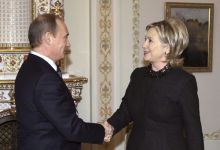The US Secretary of State Hillary Clinton said on the sidelines of the conference on human rights in Dublin on December 6 that the suppression of opposition sentiment in Eastern Europe and Central Asia could lead to re-Sovietization of these countries. According to her, the process of re-Sovietization can be masked by such names as the Customs Union and the Eurasian Union. “Let us make no mistake about it. We know what the goal is and we are trying to figure out effective ways to slow down or prevent it,” Clinton said. Russian President Putin responded to this remark on December 10.
According to the UNIAN news agency’s correspondent in Russia, Putin said he had been surprised to hear about re-Sovietization at a meeting with his election campaign representatives. “It is very strange to hear when some colleagues abroad say that our integration effort is a rebirth of Russia’s ambitions as the former Soviet Union. What rubbish!” he remarked. He stressed that the post-Soviet region integration is natural, since all these countries have a common language. “We have to a certain extent a common mentality, since we were all parts of one nation, a common transport infrastructure, energy infrastructure. Major sectors of our economies are interdependent to a huge extent, incomparably more so than what other countries and other integration associations have. I must say that our cultures have very much in common, too. Therefore, integration for us is totally a drive to improve our competitiveness,” the politician stressed. According to him, the whole world is integrating, exemplified by the EU, North America and Southeast Asia.
COMMENTARY
Vadym SKURATIVSKY, historian, philologist, writer, member of the December 1 iniative group:
“Putin said very frankly a few years ago that he was a Russian nationalist. The so-called Russian nationalism can be better described as what it, in fact, is, i.e., nothing more than the Russian imperialism, and any imperialism is extensive, trying to absorb, appropriate, and eventually take over in some form all neighboring lands. Each and every effort of the Russian president’s team and Putin himself is a reincarnation of one or another ancient gesture of the Russian imperialism. I must say that the Soviet element is just a secondary feature in this, one of the stages of the Russian imperialism. It is business as usual which will last until the so-called Putinism faces an obstacle in pursuit of its extensive imperialist agenda.
“Such statements are extremely dangerous, but I would note Putin has expressed similar opinions hundreds of times before, so this statement is no exception and should not be seen as such, it is just a continuation of his previous rhetoric. So it will be until Putin and his principal ideas retain their power as the foremost political ideas for the modern political class in Russia, and even more so, for the Kremlin leadership.
“The post-Soviet countries, of course, must respond to such statements, but I can not imagine who would do it here in Ukraine.”







